非谓语动词
非谓语动词讲解(超全)
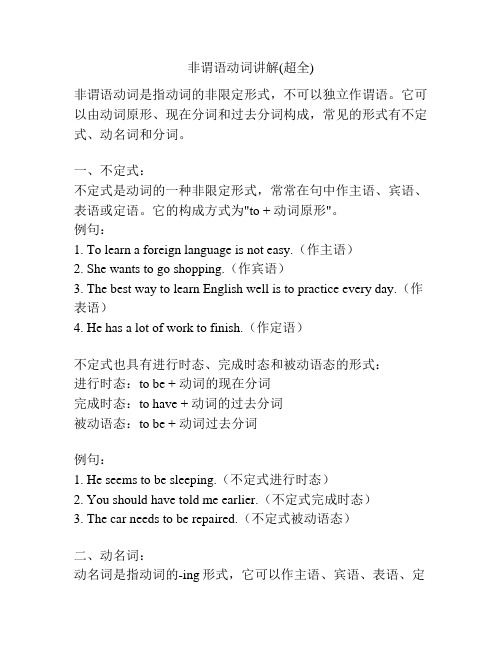
非谓语动词讲解(超全)非谓语动词是指动词的非限定形式,不可以独立作谓语。
它可以由动词原形、现在分词和过去分词构成,常见的形式有不定式、动名词和分词。
一、不定式:不定式是动词的一种非限定形式,常常在句中作主语、宾语、表语或定语。
它的构成方式为"to + 动词原形"。
例句:1. To learn a foreign language is not easy.(作主语)2. She wants to go shopping.(作宾语)3. The best way to learn English well is to practice every day.(作表语)4. He has a lot of work to finish.(作定语)不定式也具有进行时态、完成时态和被动语态的形式:进行时态:to be + 动词的现在分词完成时态:to have + 动词的过去分词被动语态:to be + 动词过去分词例句:1. He seems to be sleeping.(不定式进行时态)2. You should have told me earlier.(不定式完成时态)3. The car needs to be repaired.(不定式被动语态)二、动名词:动名词是指动词的-ing形式,它可以作主语、宾语、表语、定语或状语。
在句中的位置和用法与名词相似。
例句:1. Reading is my favorite hobby.(作主语)2. I enjoy swimming in the summer.(作宾语)3. Her dream is becoming a famous singer.(作表语)4. The girl standing over there is my sister.(作定语)5. He went to the party without saying goodbye.(作状语)动名词与不定式的区别在于动名词具有进行时态和被动语态,而不定式没有。
非谓语动词非谓语形式(详细)

动词非谓语形式一.基本概念:顾名思义,不担任谓语成分而担任其他语法功能的动词称为非谓语动词,有to do (动词不定式) / -ing (现在分词 / 动名词) / -ed (过去分词)三个形式。
由于他们不受主语人称和数的限制,故也称为"非限定动词"。
(学习中不要刻意去区分现在分词和动名词)二.非谓语动词的时态和语态意义:英语中动词有两大基本特征:时态和语态的变化。
非谓语动词也是动词,当然也具备动词的这两大特征。
1. 时态概念:非谓语动词只有"过去、现在和将来"三个时间概念,他与谓语动词时态的区别是:谓语动词表示的是实际时间概念,如I am learning English.是指讲话的时候或那段时间里"我正在学英语"。
而非谓语动词的"过去、现在和将来"是指相对于谓语动词而言的"过去、现在和将来",即先于谓语动词的行为或状态称为"过去时",与谓语动词的行为或状态发生在同一时间(段)的称为"现在时",而发生在谓语动词的行为或状态之后的称为"将来时"。
这个时间概念对于后面要讲的非谓语动词的句法功能是非常重要的。
2. 语态概念:与谓语动词一样,非谓语动词也有主动语态和被动语态之分。
也就是要记住四句话:(1) 表示将来时;(2) 表示现在时;(3) 表示过去时(一定是被动的)(4) 动词不定式的完成时表示过去时非谓语动词的上述时态和语态概念是理解非谓语动词句法功能、应试判题和翻译的基础。
请你判断一下,下面句子中的非谓语动词是什么时态和语态:Your duty is to look after the sick child. (你的责任是照料这个病孩。
将来/ 主动)The sick child needs to be looked after by a special person. (这个病孩需要专人照顾。
非谓语动词(Non-finiteverbs)
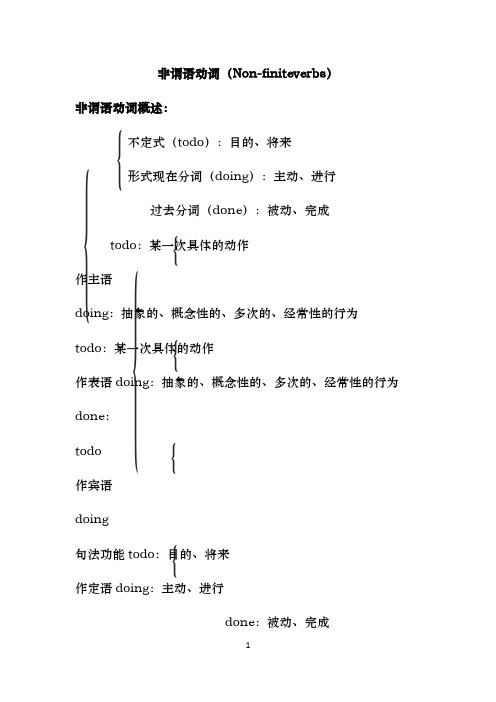
非谓语动词(Non-finiteverbs)非谓语动词概述:不定式(todo):目的、将来形式现在分词(doing):主动、进行过去分词(done):被动、完成todo:某一次具体的动作作主语doing:抽象的、概念性的、多次的、经常性的行为todo:某一次具体的动作作表语doing:抽象的、概念性的、多次的、经常性的行为done:todo作宾语doing句法功能todo:目的、将来作定语doing:主动、进行done:被动、完成todo:目的、将来作宾补doing:主动、进行done:被动、完成todo:目的、将来作状语doing:主动、进行done:被动、完成独立成分作状语n./pron.+todo/doing/done独立主格结构with的复合结构GrammarI:非谓语动词的形式(一)过去分词:过去分词只有一种形式,就是一般式done。
①单独表示一个被动的动作;②也可以单独表示动作已经完成;③还可以同时表示被动和完成。
(二)现在分词的各种形式:(三)主动被动用法一般doing beingdone doing的动作与谓语动作几e.g.1._______________(hear)thenews,theycouldn’thelpla ughing.e.g.2.Not________________(finish)thetask,theyhavetostayt hereforanothertwoweeks.e.g.3.________________(turn)offtheTVset,hebegantogoover (复习)hislessons.e.g.4.______________(heat加热),thewatergetshot.e.g.5._______________(build)forhalfayear,thebuildingbeca meourlibrary.e.g.6._______________(tell)manytimes,hestillrepeated(重复)thesamemistake.e.g.7.Isawtherewasaboy________________(blame)byhisfat her.(四)不定式的各种形式(五)e.g.1.Therearemanydishes_________________(wash)inthek itchen.SoIdon’thavetimetoseeafilmwithyoutonight.注意:非谓语动词的否定形式是在其前加notGrammarII:todo、doing作主语或表语一、todo、doing作主语的一般用法:e.g.1.Toswimtodayisagoodideae.g.2.Eatingtoomuchisbad foryourhealth.思考:todo作主语,表__________________________________________________的动作;doing作主语,表_________________________________________________的动作。
什么叫非谓语动词
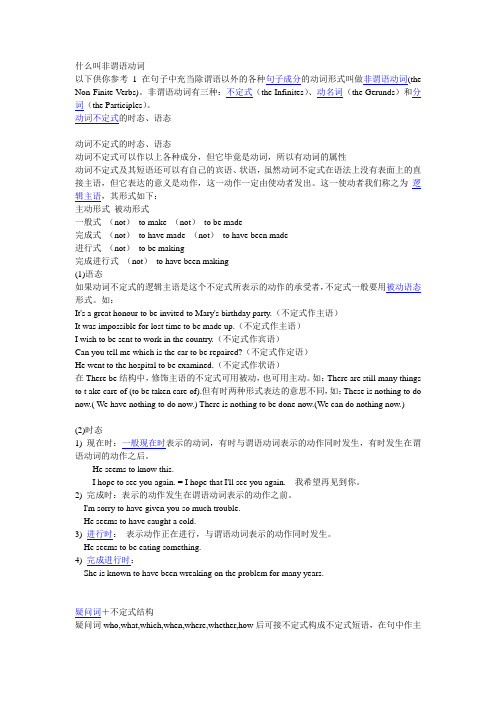
什么叫非谓语动词以下供你参考 1 在句子中充当除谓语以外的各种句子成分的动词形式叫做非谓语动词(the Non-Finite Verbs)。
非谓语动词有三种:不定式(the Infinites)、动名词(the Gerunds)和分词(the Participles)。
动词不定式的时态、语态动词不定式的时态、语态动词不定式可以作以上各种成分,但它毕竟是动词,所以有动词的属性动词不定式及其短语还可以有自己的宾语、状语,虽然动词不定式在语法上没有表面上的直接主语,但它表达的意义是动作,这一动作一定由使动者发出。
这一使动者我们称之为逻辑主语,其形式如下:主动形式被动形式一般式(not)to make (not)to be made完成式(not)to have made (not)to have been made进行式(not)to be making完成进行式(not)to have been making(1)语态如果动词不定式的逻辑主语是这个不定式所表示的动作的承受者,不定式一般要用被动语态形式。
如:It's a great honour to be invited to Mary's birthday party.(不定式作主语)It was impossible for lost time to be made up.(不定式作主语)I wish to be sent to work in the country.(不定式作宾语)Can you tell me which is the car to be repaired?(不定式作定语)He went to the hospital to be examined.(不定式作状语)在There be结构中,修饰主语的不定式可用被动,也可用主动。
如:There are still many things to t ake care of (to be taken care of).但有时两种形式表达的意思不同,如:These is nothing to do now.( We have nothing to do now.) There is nothing to be done now.(We can do nothing now.)(2)时态1) 现在时:一般现在时表示的动词,有时与谓语动词表示的动作同时发生,有时发生在谓语动词的动作之后。
非谓语动词9种形式

非谓语动词9种形式
1.不定式:to+动词原形,表示目的、原因、结果等。
2. 现在分词:动词+ing,表示主动、进行或描述。
3. 过去分词:动词+ed,表示被动、完成或描述。
4. 动名词:动词+ing,作主语、宾语或介词后的宾语。
5. 分词短语:现在分词或过去分词+其他成分,作状语或定语。
6. 带to的分词短语:to+过去分词,表示被动或完成,作状语或定语。
7. 带having的分词短语:having+过去分词,表示完成,作状语或定语。
8. 带不定式的分词短语:动词+不定式,表示目的、结果、方式,作状语或定语。
9. 带介词的分词短语:动词+介词+现在分词或过去分词,作状语或定语。
- 1 -。
非谓语动词最完整版

非谓语动词一、非谓语动词的概念动词的基本用法是作谓语。
当句中已经有了谓语动词了,要选或要填的动词就只能用非谓语形式了。
二、非谓语形式的三种形式及基本用法:1、动词不定式:to do 表示目的和将来2、动词的ing : doing 表示主动和进行3、动词的过去分词:done 表示被动和完成非谓语动词(一)——动词不定式一、不定式(to do)不定式由“to+动词原形”构成,其否定形式是“not to+动词原形”。
不定式可以带宾语或状语构成不定式短语,没有人称和数的变化,但有时态和语态的变化。
不定式可作主语、宾语、状语、表语和定语,但不能单独作谓语。
不定式运用口诀:本领最多不定式,主,表,宾,补,定和状,样样成分都能干,只有谓语它不敢,大家千万要当心,有时它把句型改,做主宾时用“it”,自己在后把身藏,七个感官三使役,宾补要把to甩开,疑问词后接上它,宾语从句可充当,逻辑主语不定式,不定式前for sb,to前not 是否定,各种用法区别开。
1. I am sorry to ________ you so much trouble. (2008 江苏)A. have givenB. have been givenC. giveD. giving答案:A简析:be sorry to have done sth 意为“已经干了某事而遗憾”,to have done是不定式的完成形式,表示先于谓语动词的动作。
B,被动形式,不合题意。
变式训练:2.The promising young man is said to ______ two novels.A. have writtenB. have been writtenC. writeD. writing (A)2.不定式的句法功能1)作主语:(谓语动词一般用单数)To finish the work in ten minutes is very hard.在十分钟内完成这项工作很难。
什么是非谓语动词

什么是非谓语动词在英语语法中,非谓语动词是一类特殊的动词形式,它不具备谓语动词的一些特征,如时态和人称的变化。
非谓语动词包括动词的不定式(infinitive)、动名词(gerund)和分词(participle)。
非谓语动词在句子中可以作为名词、形容词或副词的成分。
1. 不定式(infinitive)不定式是非谓语动词中最常见的形式之一。
它通常由动词的词根形式加上to构成,例如to go、to eat、to learn等。
不定式可以用作名词、形容词或副词。
作为名词时,不定式可以做主语、宾语、表语等。
例如:- To travel is my dream.(去旅行是我的梦想。
)- He wants to buy a new car.(他想买一辆新车。
)作为形容词时,不定式可以修饰名词,并用来表达目的、原因、结果等。
例如:- He needs a book to study.(他需要一本书来学习。
)- I am happy to see you.(我很高兴见到你。
)作为副词时,不定式用来修饰动词、形容词或副词,表示目的、结果、方式等。
例如:- She works hard to succeed.(她努力工作以获得成功。
)- He walked slowly to avoid falling.(他慢慢地走以避免摔倒。
)2. 动名词(gerund)动名词是动词的-ing形式,它可以作为一个名词在句子中使用。
与不定式不同,动名词可以作为主语、宾语、表语、介词宾语等。
例如:- Swimming is good exercise.(游泳是一项好的锻炼。
)- I enjoy singing.(我喜欢唱歌。
)动名词也可以与一些特定的动词或动词短语搭配使用,这些短语通常以动名词作为宾语。
例如:- He admitted stealing the money.(他承认偷了钱。
)- She can't help laughing.(她禁不住笑。
非谓语动词讲解(超全

非谓语动词讲解(超全非谓语动词是指动词的非谓语形式,包括动词不定式、动名词和现在分词。
与主谓结构不同,非谓语动词可在句子中作状语、定语或表语。
在英语中,非谓语动词的形式是相对固定的,但在不同的语法环境中所表示的意义和用法有所差异。
1. 动词不定式(to-infinitive)动词不定式由“to + 动词原形”构成,常常用作动词的宾语、主语、状语或定语。
例如:- 宾语:I want to go to the zoo.(我想去动物园。
)- 主语:To speak English fluently is important for your career.(流利地说英语对你的事业很重要。
)- 状语:He went to the store to buy some groceries.(他去商店买了些杂货。
)- 定语:She needs a pen to write her essay.(她需要一支笔来写作文。
)2. 动名词(gerund)动名词是将动词加上-ing构成,常常用作动词的宾语、主语、状语或定语。
例如:- 宾语:I enjoy reading books in my spare time.(我闲暇时喜欢读书。
)- 主语:Swimming is good exercise.(游泳是很好的锻炼。
)- 状语:She left the party early, feeling tired.(她因为感觉累了,所以提前离开了聚会。
)- 定语:The crying baby woke up the whole neighborhood.(哭闹的婴儿把整个邻居都吵醒了。
)3. 现在分词(present participle)现在分词由动词原形加上-ing构成,常常用作动词的宾语、主语、状语或定语。
例如:- 宾语:He enjoys playing soccer on weekends.(他喜欢周末踢足球。
)- 主语:Listening to music helps me relax.(听音乐帮助我放松。
超详细非谓语动词讲解
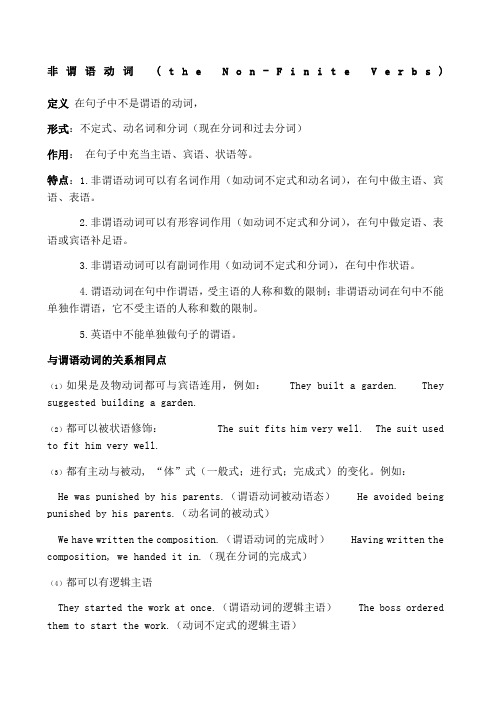
非谓语动词(t h e N o n-F i n i t e V e r b s)定义在句子中不是谓语的动词,形式:不定式、动名词和分词(现在分词和过去分词)作用:在句子中充当主语、宾语、状语等。
特点:1.非谓语动词可以有名词作用(如动词不定式和动名词),在句中做主语、宾语、表语。
2.非谓语动词可以有形容词作用(如动词不定式和分词),在句中做定语、表语或宾语补足语。
3.非谓语动词可以有副词作用(如动词不定式和分词),在句中作状语。
4.谓语动词在句中作谓语,受主语的人称和数的限制;非谓语动词在句中不能单独作谓语,它不受主语的人称和数的限制。
5.英语中不能单独做句子的谓语。
与谓语动词的关系相同点(1)如果是及物动词都可与宾语连用,例如: They built a garden. They suggested building a garden.(2)都可以被状语修饰: The suit fits him very well. The suit used to fit him very well.(3)都有主动与被动, “体”式(一般式;进行式;完成式)的变化。
例如:He was punished by his parents.(谓语动词被动语态) He avoided being punished by his parents.(动名词的被动式)We have written the composition.(谓语动词的完成时) Having written the composition, we handed it in.(现在分词的完成式)(4)都可以有逻辑主语They started the work at once.(谓语动词的逻辑主语) The boss ordered them to start the work.(动词不定式的逻辑主语)We are League members.(谓语动词的主语) We being League member, the work was well done. (现在分词的逻辑主语)不定式一、形式功能:动词不定式:(to)+do,具有名词、形容词、副词的特征。
非谓语动词(non-finite verbs)

在英语中,不做句子谓语,而具有谓语外其他语法功能的动词中,叫“非谓语动词”非谓语动词包括:动词不定式(the Infinitive)动名词(the Gerund)现在分词(the Present Participle)过去分词(the Past Participle)Ⅰ。
动词不定式:动词不定式有两种,带“to”和不带“to(动词原型)”,有人称之为“光秃不定式”,在大多数情况下不定式都带to,动词不定式由“to+动词原型”,这里的to是不定式标志,没有词义,不定式具有名词,形容词,或副词的某些语法功能,又有动词的时态和语态。
一:1。
不定式做主语:eg : To over come the problem is very difficult不定式做主语,往往用it做形式主语,真正的主语不定式放置句子后面:eg : It‟s so nice to hear your voice.但是,用不定式做主语的句子中还有一个不定式做表语时,不能用it‟s…to…的句型eg : To teach is to learn.比较“it‟s for sb和it‟s of sb1)for sb句型中的形容词一般为表示事物的特征特点,表示客观形式的形容词,如”easy, hard, difficult, impossible”等2)of sb句型中的形容词一般为表示性格,品德,心智能力,表示主观感情或态度的形容词,如”good, kind, nice, clever, foolish”等3)用介词for或者of后面的逻辑主语做句子的主格,用介词前边的形容词做表语,造这个句子,如果通顺用of,不通则用for2.不定式做表语:不定式可放在be动词后面,形成表语eg : My dream is to be a teacher.3.不定式做宾语1)有些及物动词用不定式做宾语,结构为“动词+不定式”P2892)有些动词除了可以用不定式做宾语,还用些不定式做补语,即“动词+宾语+不定式”结构eg : I like to keep everything tidy.I like you to keep everything tidy.3)有些动词或动词词组可以用“动词+疑问词+不定式”的结构:eg : I want to know how to solve the problem.4)如果不定式(宾语)后面有宾语补足语,则用“ it ”做形式宾语,真正的宾语(不定式)后置,放在宾语补足语4.不定式做补语1)有些动词+宾语+不定式P291eg : Father will not allow us to play on the street.2)有些动词+宾语+不定式的结构,不定式的动词往往是be,不定式一般可以省去eg : We believe him (to be) quilty (adj.)我们相信他是有罪的We know him to be fool. (n.) (to be不能省)3)有些动词可以跟”there + to be的结构eg : We didn‟t expect there to be so many people.You wouldn‟t want there to be another war. 你不至于想让另外一场战争发生吧?5.不定式做定语不定式做宾语,通常要放在被修饰的词后,往往表示未发生的动作。
三种非谓语动词的形式

非谓语动词是指在句子中不是谓语的动词,主要包括不定式、动名词和分词(现在分词和过去分词)。
以下是三种非谓语动词的形式及示例:1,不定式(Infinitives):不定式由“to+动词原形”构成,在句子中可以作主语、宾语、表语、定语、状语等成分。
作主语:To learn English is important.(学英语很重要。
)作宾语:I want to go to the park.(我想去公园。
)作表语:My dream is to become a doctor.(我的梦想是成为一名医生。
)作定语:She has a lot of work to do.(她有很多工作要做。
)作状语:He ran to the station to catch the train.(他跑到车站去赶火车。
)2,动名词(Gerunds):动名词由“动词+ing”构成,在句子中可以作主语、宾语、表语、定语等成分。
作主语:Eating healthy food is important.(吃健康的食物很重要。
)作宾语:I enjoy playing football.(我喜欢踢足球。
)作表语:My hobby is reading.(我的爱好是阅读。
)作定语:She has a swimming pool in her backyard.(她的后院有一个游泳池。
)3,分词(Participles):分词分为现在分词和过去分词,现在分词由“动词+ing”构成,过去分词由“动词+ed”或“不规则变化”构成,在句子中可以作定语、状语、补语等成分。
作定语:The running man is my brother.(正在跑步的男人是我的哥哥。
)作状语:Walking in the park, she met her friend.(她在公园里散步时遇到了她的朋友。
)作补语:I saw him playing football on the playground.(我看到他在操场上踢足球。
非谓语动词的定义是什么意思

非谓语动词的定义是什么意思非谓语动词的定义是什么意思非谓语动词,又叫非限定动词,非谓语动词是指在句子中不是谓语的动词,主要包括不定式、动名词和分词(现在分词和过去分词),即动词的非谓语形式。
下面是店铺给大家整理的非谓语动词的定义简介,希望能帮到大家!非谓语动词的定义在句子中充当除谓语以外的各种句子成分的动词形式,叫做非谓语动词(the Non-Finite Verbs)。
非谓语动词也是动词的一种,他们有着动词的其他特点,可以充当主语、宾语、状语等。
非谓语动词与谓语动词是相对的概念。
非谓语动词与谓语动词相同点如果是及物动词都可与宾语连用,例如:They built a garden.They suggested building a garden.都可以被状语修饰:The suit fits him very well.The suit used to fit him very well.都有主动与被动,“体”式(一般式;进行式;完成式)的变化。
例如:He was punished by his parents.(谓语动词被动语态)He avoided being punished by his parents.(动名词的被动式)We have written the composition.(谓语动词的完成时)Having written the composition,we handed it in.(现在分词的完成式)都可以有逻辑主语They started the work at once.(谓语动词的逻辑主语)The boss ordered them to start the work.(动词不定式的逻辑主语)We are League members.(谓语动词的主语)We being League member,the work was well done. (现在分词的逻辑主语)否定式一般用not,并且放在非谓语动词之前不同点非谓语动词可以有名词作用(如动词不定式和动名词),在句中做主语、宾语、表语。
非谓语动词有哪些 什么是非谓语动词

非谓语动词有哪些什么是非谓语动词
在句子中充当除谓语以外的句子的各种成分的动词形式,叫做非谓语动词。
那么非谓语动词有哪些情况呢?
非谓语动词有哪些
1非谓语动词
非谓语动词有5种情况,分别是动词做主语、动词作宾语、动词作定语、动词作状语、动词作补语,动词作宾语示例:I like watching TV,这就把它变成了ing形式,把它名词化这就叫动词做宾语。
再看动词作定语he is a boy lying under the tree。
lying就是定语修饰boy。
躺在树下的男孩。
再看做状语的。
hearing the news she went crazy。
听到消息她疯了。
听到消息就是一个状态。
hearing the news she went crazy。
这里需要注意的是,从句部分根本不是一个句子,它只是一个动词,所以这个部分呢,我们就要把它叫动词做状语,而不能叫状语从句。
所以非谓语动词一共是5种情况,动词分别做主语、宾语,定语、状语、补语。
2非谓语动词与谓语动词不同点
非谓语动词可以有名词作用(如动词不定式和动名词),在句中做主语、宾语、表语。
非谓语动词可以有形容词作用(如动词不定式和分词),在句中做定语、表语或宾语补足语。
非谓语动词可以有副词作用(如动词不定式和分词),在句中作状语。
谓语动词在句中作谓语,受主语的人称和数的限制;非谓语动词在句中不能单独作谓语,它不受主语的人称和数的限制。
英语中不能单独做句子的谓语。
非谓语动词(Non-finite Verb)
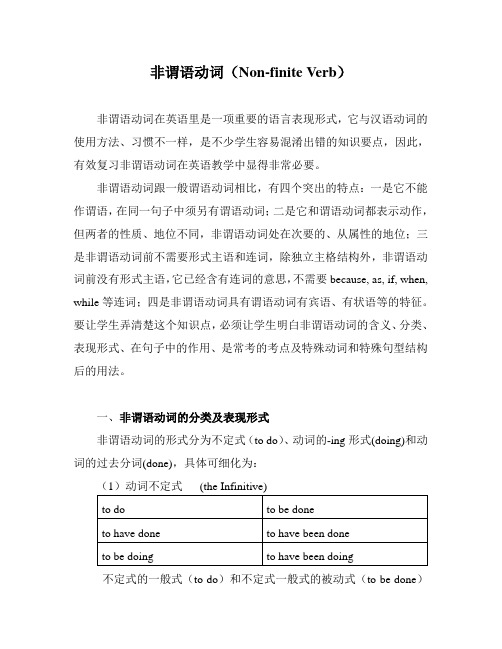
非谓语动词(Non-finite Verb)非谓语动词在英语里是一项重要的语言表现形式,它与汉语动词的使用方法、习惯不一样,是不少学生容易混淆出错的知识要点,因此,有效复习非谓语动词在英语教学中显得非常必要。
非谓语动词跟一般谓语动词相比,有四个突出的特点:一是它不能作谓语,在同一句子中须另有谓语动词;二是它和谓语动词都表示动作,但两者的性质、地位不同,非谓语动词处在次要的、从属性的地位;三是非谓语动词前不需要形式主语和连词,除独立主格结构外,非谓语动词前没有形式主语,它已经含有连词的意思,不需要because, as, if, when, while等连词;四是非谓语动词具有谓语动词有宾语、有状语等的特征。
要让学生弄清楚这个知识点,必须让学生明白非谓语动词的含义、分类、表现形式、在句子中的作用、是常考的考点及特殊动词和特殊句型结构后的用法。
一、非谓语动词的分类及表现形式非谓语动词的形式分为不定式(to do)、动词的-ing形式(doing)和动词的过去分词(done),具体可细化为:(1)动词不定式(the Infinitive)不定式的一般式(to do)和不定式一般式的被动式(to be done)在句中常常表示将来情况,不定式的完成式(to have done)和不定式的完成被动式(to have been done)表示完成状态,不定式的进行式和不定式的完成进行式(to have been doing)常表示动作的进行。
(2)V-ing(动名词the Gerund +现在分词the Present Participle)在句中动词-ing形式的一般式(doing)和一般式的被动式(being done)表示动作正在进行,动词-ing形式的完成式(having done)和完成被动式(having been done)表示动作的完成,且在句中不能作定语,常作状语使用。
(3)动词的过去分词(the Past Participle)在句中动词的过去分词(done)表示被动的、完成的动作。
非谓语动词讲解 超全

非谓语动词讲解超全非谓语动词是指不具有人称和数的动词形式,不需要依附主语就可以使用的动词形式。
非谓语动词包括动词不定式、动名词和现在分词等形式。
非谓语动词的使用可以丰富句子结构,增强表达效果,表达出动作的进行、完成、目的、原因等不同的语义关系。
一、动词不定式动词不定式是动词的一种非谓语形式,由“to” + 原形动词构成,具有名词、形容词或副词的特性。
1. 作主语:To learn English well is my goal.(学好英语是我的目标。
)2. 作宾语:I want to take a nap.(我想睡个觉。
)3. 作宾补:She found it difficult to solve the math problem.(她发现解决这个数学问题很困难。
)4. 作表语:My dream is to become a teacher.(我的梦想是成为一名教师。
)5. 作状语:He left the room to make a phone call.(他离开房间去打电话。
)二、动名词动名词是动词的一种非谓语形式,多用于表示动作的稳定状态或被动的形式,常常作主语、宾语或介词的宾语。
1. 作主语:Swimming is my favorite sport.(游泳是我最喜欢的运动。
)2. 作宾语:I enjoy reading books.(我喜欢阅读书籍。
)3. 作宾补:He kept silent, not wanting to reveal the secret.(他保持沉默,不想泄露秘密。
)4. 作介词的宾语:She is good at playing the piano.(她擅长弹钢琴。
)三、现在分词现在分词是动词的一种非谓语形式,通常以-ing结尾,可以表示主动、进行、伴随等含义。
1. 作定语:The running dog scared the child.(奔跑的狗吓唬了孩子。
非谓语动词是什么

非谓语动词是什么非谓语动词是动词的特殊形式,在句子中可以作谓语以外的所有成分。
非谓语动词包括动词ing形式,动词ed形式和不定式to do形式。
非谓语的基本形式一、动词ing形式动词ing形式包括现在分词和动名词。
动名词由动词原形加ing构成,有一般式、完成式。
1.动名词(一)作主语Seeing is believing.眼见为实。
Learning new words is very important.学习生词非常重要。
常见句型:It's + no use/ no good/ a waste of time + ing形式It's no use arguing about it.争论那件事毫无用处。
It's a waste of time your talking to him.你跟他说话,真是浪费时间。
(二)作宾语①以下动词后常跟动名词作宾语:love, like, hate, prefer, begin, enjoy,dislike, start, continue, intend, attempt, propose, want, need, remember, forget, neglect, try, deserve, involve, keep, mind, miss, postpone, resist, suggest.例如:I enjoy working with you.我喜欢和你共事。
Would you mind filling out this form?请你填这张表格好吗?②下列短语中的to均为介词,短语后使用动名词作宾语:attach importance to, be used to, devote…to, in addition to, look forward to, object to, be opposed to, approach to…例如:I was used to staying up late when I was in the college. 读大学我习惯熬夜。
- 1、下载文档前请自行甄别文档内容的完整性,平台不提供额外的编辑、内容补充、找答案等附加服务。
- 2、"仅部分预览"的文档,不可在线预览部分如存在完整性等问题,可反馈申请退款(可完整预览的文档不适用该条件!)。
- 3、如文档侵犯您的权益,请联系客服反馈,我们会尽快为您处理(人工客服工作时间:9:00-18:30)。
训练指要1.考查非谓语动词的试题常常考查一些常用动词以及特殊动词对其后非谓语动词的形式(不定式、过去分词及v.-ing形式)的不同要求。
有时也涉及到非谓语动词的完成式和否定式。
在做非谓语试题时可以分三个步骤:(1)分析句子成分;(2)搞清非谓语动词与其逻辑主语的关系;(3)确定行为时间及先后顺序等。
2.高考对非谓语动词的测试方向:(1)不定式的完成式、被动式和进行式;(2)不定式的省略;(3)测试只能接动名词的动词和接动名词、不定式有区别的动词的用法;(4)现在分词作宾补、作定语、作状语的用法;(5)测试非谓语动词的否定式。
1.(2002全国高考题)Having a trip abroad is certainly good for the old couple,but it rem ains ________ whether they will enjoy it.A.to seeB.to be seenC.seeingD.seen2.(2002全国高考题)The research is so designed that once ________ nothing can be done to change it.A.beginsB.having begunC.beginningD.begun3.(2003北京春季高考题)Mr.Smith,________ of the ________ speech,started to read a novel.A.tired; boringB.tiring; boredC.tired; boredD.tiring; boring4.(2003上海春季高考题)Friendship is like money: easier made than ________.A.keptB.to be keptC.keepingD.being kept5.(2003上海春季高考题)________ the meeting himself gave them a great deal of encour agement.A.The president will attendB.The president to attendC.The president attendedD.The president’s attending6.(2003上海春季高考题)Unless ________ to speak,you should remain silent at the conf erence.A.invitedB.invitingC.being invitedD.having invited7.(2003上海春季高考题)She will tell us why she feels so strongly that each of us has a role ________ in making the earth a better place to live.A.to have playedB.to playC.to be playedD.to be playing8.(2002北京高考题)—How do you deal with the disagreement between the company and the customers?—The key ________ the problem is to meet the demand ________ by the customers? A.to solving; making B.to solving; madeC.to solve; makingD.to solve; made9.(2002上海高考题)In order to gain a bigger share in the international market,many state-run companies are striving ________ their products more competitive.A.to makeB.makingC.to have madeD.having made10.(2002上海高考题)Though ________ money,his parentsmanaged to send him to unive rsity.ckedcking ofckingcked in11.(2002上海高考题)Don’t use words,expressions,or phrases ________ only to people with specific knowledge.A.being knownB.having been knownC.to be knownD.known12.(2002上海高考题)________ to sunlight for too much time will do harm to one’s s kin.A.ExposedB.Having exposedC.Being exposedD.After being exposed13.The patient was warned ________ oily food after the operation.A.to eat notB.eating notC.not to eatD.not eating14.Go on ________ the other exercise after you have finished this one.A.to doB.doingC.withD.to be doing15.Jane was made ________ the truck for a week as a punishment.A.to washB.washingC.washD.to be washing16.—The light in the office is still on.—Oh,I forget ________A.turning it offB.turn it offC.to turn it offD.having turned it off17.Little Jim should love ________ to the theatre this evening.A.to be takenB.to takeC.being takenD.taking18.The boy wanted to ride his bicycle in the street; but his mother told him ________.A.not toB.not to doC.not do itD.do not to19.I would love ________to the party last night but I had to work extra hours to finisha report.A.to goB.to have goneC.to be goneD.going20.The houses ________ are for the old people and the construction work will start soon.A.builtB.to be builtC.to buildD.being built21.We must do whatever we can ________ those who are in trouble.A.to helpB.helpC.helpingD.do help22.The secretary worked late into the night,________ a long speech for the president.A.to prepareB.preparingC.preparedD.was preparing23.With a lot of difficult problems ________,the manager felt worried all the time.A.settledB.settlingC.to settleD.being settled24.________ up at his father,he asked what was the matter with him.A.Having lookedB.LookingC.To lookD.Look25.Prices of daily goods ________ through a computer can be lower than store prices.A.are boughtB.been boughtC.buyingD.bought26.—Did you get a book?—No.I ________,but there were not any ________.A.tried; to be leftB.had tried; leavingC.tried to; leftD.had tried; have left27.If a thing is worth ________,it must be well ________.A.doing; doneB.to do; doingC.to do; doneD.being done; doing28.It is no use ________ now.He is busy.A.asking him comingB.to ask him comingC.asking him to comeD.to ask him to come29.________ from his clothes,he is not so poor.A.JudgedB.JudgingC.To judgeD.Having judged30.________ your head,and you’ll see the sun ________ now.A.Raise; risingB.Raise; raisingC.To raise; risingD.Lift; being risen31.The Olympic Games,________ in 776 B.C.,did not include women players until 1912.A.first playingB.to be first playedC.to be first playingD.first played32.He stood there for a while with his hands ________.A.raisingB.raisedC.roseD.risen33.When ________ her father,the girl burst out crying.A.asking of`B.asked aboutC.being askedD.asked34.The man kept silent in the room unless ________.A.spokenB.speakingC.to speakD.spoken to35.Many things ________ impossible in the past are very common today.A.consideringB.to considerC.consideredD.being considered36.On my way home,I saw a thief ________ money from a lady by the police.A.being caughtB.having caughtC.caught stealingD.have caught to steal37.The speaker raised his voice but still couldn’t make himself ________.A.hearB.to hearC.heardD.hearing38.With trees,flowers and grass ________ everywhere my native town had taken on a n ew look.A.plantingB.plantedC.to plantD.to be planted39.The professor came into the lab,________ by his assistant.A.followingB.followedC.being followedD.to follow40.I’ve had my radio ________ so soon because my father had me ________ it.A.repair; doneB.repaired; doC.repairing; doD.repaired; done41.Only by ________ too much money can we live through these months.A.wastingB.no wastingC.not wastingD.wasted42.These old persons want ________ good care of.A.takingB.to takeC.takenD.be taken43.Not ________ it right,he was encouraged to try again.A.didB.doneC.to doD.having done44.A letter has been written to him,________ him to the party.A.inviteB.to inviteC.invitedD.inviting45.I feel it an honor ________ here.A.asked to speakB.to ask to speakC.to be asked to speakD.to be asked speaking46.Who do you think ________ him angry?A.madeB.makeC.to makeD.making47.I prefer to stay at home rather than ________ shopping.A.goB.goingC.to goD.to be going48.She pretended ________ me when I passed by.A.having not seenB.not seeingC.to not seeD.not to see49. “Can’t you read?” Mary said,________ to the notice.A.angrily pointingB.and point angrilyC.angrily pointedD.and angrily pointing50.The visiting Minister expressed his satisfaction with his talks,________ that he had e njoyed his stay here.A.having addedB.to addC.addingD.added51.European football is played in 80 countries,________ it the most popular sport in the world.A.makingB.makesC.madeD.to make52.If ________ ill,I’ll stay home,________ a good rest.A.to fall; takingB.fall; to takingC.falling; takingD.falling; take53.It was so cold that we had the fire ________ all night.A.burnsB.burningC.to burnD.to be burning54.All the people,the wounded ________,were brought to safety.A.includedB.includingC.includeD.to include55.________,the boy couldn’t enter his house.A.Since the key has lostB.The key was lostC.Lost the keyD.Having lost the key56.They seemed to be eating something ________ on the fire.A.cookedB.being cookedC.that had cookedD.having been cooked57.The youngest daughter got angry again.Mother fe lt very ________ and father’s face w ore a ________ expression,too.A.puzzled; puzzledB.puzzling; puzzledC.puzzling; puzzlingD.puzzled; puzzling58.He stepped into his room,only ________ a lot of things ________.A.finding; robbedB.to find; stolenC.found; missedD.to find; robbed59.—You were brave enough to raise objections at the meeting.—Well,now I regret ________ that.A.to doB.having doneC.to be doingD.to have done60.I know them ________ good friends when they were young.A.had beenB.to beC.wereD.to have been高考能力测试步步高英语基础训练9答案基础训练9动词(四)非谓语动词Ⅰ.单项填空1~5 BDAAD 6~10 ABBAC11~15 DCCAA 16~20 CAABB21~25 ABCBD 26~30 CACBA31~35 DBBDC 36~40 CCBBB41~45 CADDC 46~50 AADAC51~55 ACBAD 56~60 AABBD【解析】1.remain to be seen“有待观察”。
